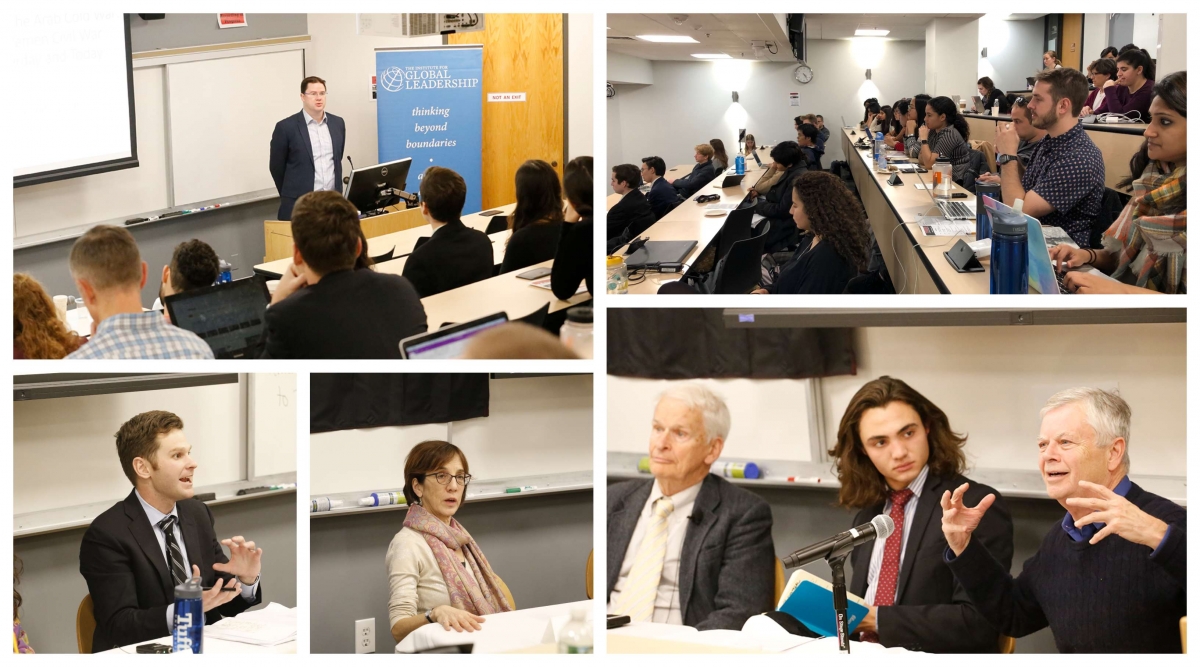NIMEP hosts Symposium on “Yemen: Civil Conflict and Intervention” by Taylor Lewis and Colin Kennedy

At the end of the first semester, the New Initiative for Middle East Peace (NIMEP) program hosted its first symposium on “Yemen: Civil Conflict and Intervention” to help the campus understand the history and geopolitics of the current war, its complexities and its humanitarian consequences.
The keynote was delivered by Asher Orkaby, one of the foremost experts in the United States on Yemen and its history. Two panels followed the keynote, the first on the geopolitics of the crisis, featuring former U.S. Ambassador to Yemen Charles Dunbar and Award-winning Journalist Stephen Kinzer and joined by Dr. Orkaby. The second panel focused on the humanitarian crisis, featuring U.S. Army Captain James Micciche and International Policy Adviser for Physicians for Human Rights Susannah Sirkin.
Dr. Orkaby gave a comprehensive talk on how historical and societal factors led to the current civil war in Yemen, arguing that the intervention of geopolitics – specifically Saudi Arabia and Iran – has prolonged it. He also stressed the historical and cultural differences within a united Yemen. The country, which united in 1990, had been separated by the Ottoman occupation of the north-west and British occupation of the Aden Protectorate. Indeed, the current borders of the conflict resemble the previous borders with Houthi rebels occupying much of the north, while the government holds more control in the south.
Dr. Orkaby concluded with a discussion of the decline in influence of the Yemeni intellectuals who first created the united Yemen republic. The next generation is now at the helm—a group that he argued does not have the same forward thinking as the founding group. All of these historical and societal factors, he argued, are often overlooked due to the international media’s focus on the Saudi Arabia—Iran proxy war.
That being said, the tensions between Saudi Arabia and Iran cannot be overlooked and took center stage in the first panel on the geopolitical complexities surrounding the conflict. Former Ambassador Charles Dunbar began the discussion by addressing Saudi Arabia’s role. He contended that Crown Prince Mohammed bin Salman’s nationalization of different economic agencies in Saudi Arabia demonstrates his complete authority because he has, in a sense, dismantled the previous oligarchical system. This has cemented Saudi Arabia’s national interest in regional hegemony and, by extension, the containment of the rise of Iran. This larger tension between Riyadh and Tehran has manifested itself as several proxy conflicts throughout the Middle East and is one of the largest reasons that the Yemen War has been dragged out into what is being called the worst humanitarian crisis in the world.
Following this, Stephen Kinzer made several points regarding the role of the U.S. in Yemen, and how weapons sales have become a cornerstone of U.S. foreign policy. It is unlikely that Washington will place an embargo on Saudi Arabia, regardless of humanitarian violations or the murder of journalist Jamal Khashoggi. Finally, Mr. Kinzer pointed out that the Houthi rebels were not originally an Iranian proxy, but rather it was the war’s escalation and Saudi involvement that led to Iran becoming more involved.
The conflict’s escalation led to the second panel discussion centered on the current humanitarian crisis that now confronts Yemeni citizens daily. Ten million people, or 44 percent of Yemen’s population, are undernourished; an estimated two million children have acute malnutrition; over one million Yemeni are estimated to have cholera; 90 percent of internally displaced people lack access to basic human needs.
Susannah Sirkin then spoke about a key reason behind the conflict’s severity: the targeting of health professionals and facilities throughout the country. She works with Physicians for Human Rights, an organization which has been documenting attacks against health services in conflict-prone regions (a direct violation of the Geneva Convention and international norms). Initially, the attacks were likely because of imprecise targeting equipment, and weapons were being used indiscriminately.
More than half of Yemen’s health facilities are non-functioning, and a majority of the country’s population lacks access to healthcare. The 23 attacks on hospitals, which Ms. Sirkin’s organization recorded in the past year, have had compounding effects on Yemen’s crisis—disproportionately impacting the sick and elderly, spreading terror among the population, and eroding measures in place to prevent the spread of infectious diseases such as cholera. The solution, argued Ms. Sirkin, lies in holding the belligerents accountable by a proliferation of information, embargos, and eventually through international courts.
CPT Micciche rounded out the discussion with his on-the-ground experience by talking about the Saudi-led blockade that has crippled the Yemeni economy and exacerbated the nation’s widespread famine. He talked about his team’s founding of the Maritime Combined Coordination Cell, a group which helped get both commercial and humanitarian aid vessels into the ports. Here the Captain highlighted the importance of the free exchange of goods, as humanitarian aid only contributes ten percent of the total needed food. Additionally, he discussed the system’s lack of efficiency, with supplies sitting on boats outside ports for days and getting lost. Even after arriving on land, goods are passed to local truckers to distribute—a low-cost solution that results, however, in losses to belligerents and corruption. To measure his success (or lack thereof), CPT Micciche would track Yemeni food prices and accessibility. He emphasized the importance of rebuilding economic stability as part of a long-term solution to the crisis.
